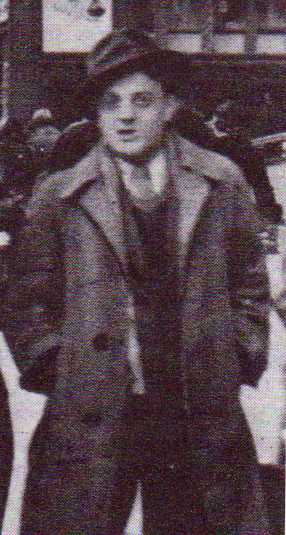| Home > Moyshe Shimel > About Moyshe Shimel |
| Moyshe Shimel (Maurycy Szymel) |
 Photo credit:
Photo credit:Source: cropped from E. Prokop-Janiec (first ref below), p.19, from Chwila 1934. Moyshe Shimel (1903 - 1942) was born in the city of Lemberg, (now Lviv) the capital of Austro-Hungarian Galicia. He matriculated from the Polish language Jewish Humanistic High School which his friend Dov Sztok, who became Dov Sadan, Professor of Yiddish at Hebrew University, also attended. Presumably Shimel was from a middle-class Jewish family. Sisters are mentioned in his poetry. After the First World War Lemberg became Lwow, the largest city in eastern Poland, and its University was a standard-bearer of Polish language and culture. By 22 years of age the poet was writing in Chwila ("moment"), Lwow's Jewish daily newspaper in the Polish language, as Maurycy Szymel. He quickly became a pillar of the children's supplement (Chwilka), contributing short stories, plays and poetry –as well as poetry for adults. Two of his poems in Chwila are at http://www.lwow.com.pl/rocznik/chwila.html "Fragrance of milk and honey" (1931) there expresses well the newspaper's dual allegiance in that period, to Poland and to Zionism. By 1929 actors were performing his poetry, sometimes with musical accompaniment, (together with that of two other young poets, Daniel Ihr and Stefan Pomer). But then Szymel went on to perform his own impressive recitations of his poems. Even after he moved in 1930 to Warsaw, he would return and give performances in Lwow. And his contributions to Chwila continued right up to the War. A. His Polish poetry. Three books of his Polish poetry were published in Warsaw, in 1931, 1932 and 1935. A novel was published in 1938 in instalments. (see first reference below). Szymel's Polish poems are directed to an imagined Polish non-Jewish reader – though later, in his Yiddish verse, Szymel would complain how unsuccessful his attempt at acceptance as a European really was. Chwila readers though, were Polish-speaking Jews, presumably on a similar quest for acceptance to his own. In the Gregoreks' American Poetry Review article we find a transgressive poem for this readership: in To, Szymel writes of a Jewish man's love for a gentile woman: "I am not allowed to write about you in my own words. / My mother wouldn't be able to pronounce your name /... and you will never understand my sisters' anxious speech /... why do you pass by our homes and avoid our hallways? / I know one thing - a proud, high, and cold cross / climbs above our heads with its tall shadow." In Warsaw Szymel did write for several non-Jewish publications as well. A number of poems seem to offer bridges, for Poles better to understand Polish Jewish life. The narrator's voice is European, conversant with traditional Jewish life while distanced from it. Lag b'Omer (also in the Gregoreks' translation) gives a vivid and convincing picture of cheder boys' "time out" – on "one day full of sunshine and sparks/.. when cheder children go to the countryside / with a song of joy which seems endless. / They are armed with bows and wooden quivers, / fresh pretzels hidden in their bags." Their everyday life is altogether different to that of non-Jewish children – "girls are sick, boys pale. / They toil in cheders over an old Torah." They return, at the end of the day, "to the narrow streets, constricted halls."
The Yiddish poems appeared in Haynt, Shriftn and the Tsaytlins' Globus. His sole book in Yiddish, Mir iz umetik, was published in 1936 in Vienna (author Moyshe Shimel) and was republished a year later in Warsaw. It is a rare book today. Melbourne's Kadimah Library is fortunate to have a copy. His Yiddish poetry is very different to the Polish. One minute we are enjoying reading undemanding pleasantly urbane, cultured verses, like the first three in our selection here, when suddenly – raw neurotic terror is described, as palpable as in a clinical case study – and this fear pervades a whole series of Shimel's poems. We give one example only, the fourth in our selection. (This poem was set to music by Yankev Vayngortn and was published in Kaczerginski's book "Lider fun Getos un Lagern" ed. H. Leyvick with the inappropriate title "Di Eybikayt".) These poems both startle and stay with the reader. Paner and Frenkel understood that this was the most remarkable aspect of Shimel's oeuvre and represented him by two of these poems in their post-War Anthology (Jassy, 1947). One describes the author's fears, the other – the fears of a park bench. When the Germans arrived Shimel returned to Lwow, now in the Russian zone. After the Germans invaded in 1941, he worked in the Lwow Ghetto in the Judenrat. He is thought to have been murdered with the others, in 1942.
Dos lid iz geblibn, the anthology of murdered poets published in Warsaw soon after the War, has no fewer than 11 of his poems. (Binem Heller, the Communist editor, to his credit did not shrink from Shimel, despite Szymel's declared bourgeois apolitical stance, well illustrated in our selection.) See also the Leksikon, which mentions several poems published in 1940 in the Kiev Sovyetishe Literatur (no.3). Post-War he was anthologized too in the Rumanian anthology of Paner and Frenkel , the Polish anthology of Lastik and Slucki and (consequently) in the East German Der Fiedler vom Geto by H Witt. In 1995 a bilingual (Polish and Hebrew) edition of his verse appeared in Israel, translated by Szoszana Raczynska. Further references to two Israeli biographical acounts and translations from Polish into Hebrew appear in http://www.ashevillepoetryreview.com/2003/issue-13/the-biography-of-maurycy-szymel
|
